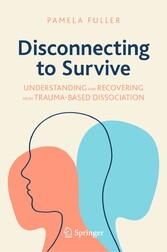Disconnecting to Survive - Understanding and Recovering from Trauma-based Dissociation
von: Pamela Fuller
Springer-Verlag, 2023
ISBN: 9783031481543
, 164 Seiten
Format: PDF
Kopierschutz: Wasserzeichen
Preis: 37,44 EUR
eBook anfordern 
Mehr zum Inhalt

Disconnecting to Survive - Understanding and Recovering from Trauma-based Dissociation
This book provides up-to-date guidance on how to recognize and reduce trauma-based dissociation. Through a therapist-guided approach, readers will increase their awareness of their own experiences of dissociation and develop strategies for reducing these responses, with an overall goal of feeling more connected within themselves and with others.
Trauma-based dissociation usually first occurs during a very threatening situation from which there is no physical escape. The dissociative response happens automatically for protection outside of awareness, so the person doesn't realize what they were doing. This protective response can happen again when other concerning situations occur, and eventually develop into an automatic response to perceived threats.
Disconnecting to Survive: Understanding and Recovering from Trauma-based Dissociation is a guide for individuals who experience dissociation or wonder if they do, and for their family, friends, and professionals who want to help them. Several unique features of this book make it valuable as a therapeutic experience for trauma survivors as well as a useful resource for professionals. 'Check-ins' throughout the book provide an in-the-moment experience of self-monitoring and pacing while reading. Frequent case examples enhance understanding of the ideas described and validate the experiences of readers who have persevered through traumatic life situations. A section at the end of each chapter provides opportunity to explore how the concepts apply to the reader. Readers also will learn about a three-phase model for determining their present needs and their readiness for different interventions based on their phase of trauma recovery. In addition to physical, emotional, and sexual abuse, other types of interpersonal trauma are delineated, including race-based trauma, religious trauma, medical trauma, emotional neglect, military-related trauma, and mistreatment due to sexual orientation. In addition, a chapter is devoted to each of the important topics of dissociation in children and the relationship between trauma, dissociation, and psychosis.
Pamela Fuller is a clinical psychologist with over thirty years of experience helping young children through older adults recover from the negative impacts of life experience. She specializes in trauma treatment, self-development, dissociation, psychosis, and relationship issues. Dr. Fuller also serves as an adjunct assistant professor in the Department of Psychiatry in the University of Utah School of Medicine. She has presented nationally and internationally on a variety of topics, particularly related to trauma treatment, crisis intervention, and phase-specific treatment of psychosis. Her book, Surviving, Existing, or Living: Phase-specific therapy for severe psychosis is available in both English and Spanish.












